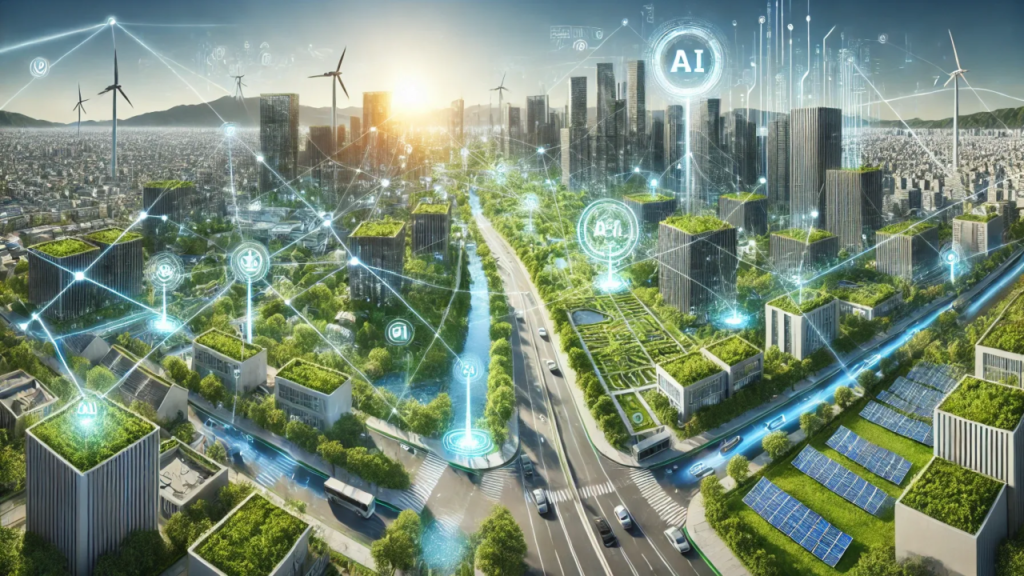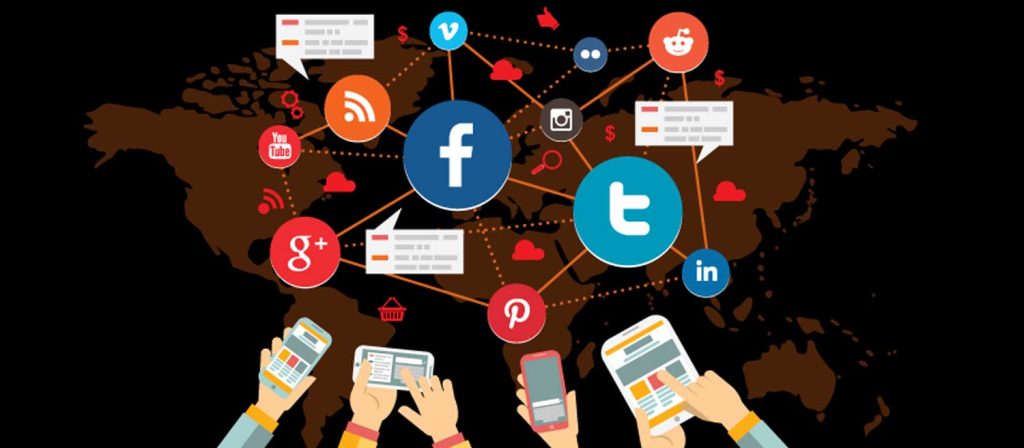Urbanization is accelerating worldwide, leading to increased energy consumption, pollution, and infrastructure challenges. Traditional urban management methods struggle to balance economic growth with environmental sustainability. Artificial Intelligence (AI) is emerging as a powerful tool to optimize city operations, reduce carbon footprints, and improve residents’ quality of life. AI-driven solutions in transportation, energy management, waste reduction, and resource allocation are key to building eco-friendly smart cities.
AI Applications in Sustainable Smart Cities
1. AI-Powered Smart Energy Grids
- AI optimizes power distribution by balancing supply and demand in real-time.
- Predictive analytics reduce energy wastage by forecasting peak usage periods.
- AI-driven grid automation improves efficiency by detecting faults and optimizing energy flow.
2. Intelligent Public Transportation and Traffic Management
- AI-powered traffic prediction models reduce congestion and emissions by optimizing routes.
- Smart traffic lights adapt to real-time conditions, minimizing idle time and fuel consumption.
- AI enhances public transit planning by analyzing commuter patterns and adjusting schedules.
3. Sustainable Building Management with AI
- AI-powered HVAC (Heating, Ventilation, and Air Conditioning) systems optimize energy use.
- Smart sensors regulate lighting and temperature based on occupancy, reducing electricity consumption.
- AI-driven building design improves sustainability by recommending eco-friendly materials and energy-efficient structures.
4. AI for Waste Management and Recycling
- AI-powered sorting systems improve waste separation for effective recycling.
- Predictive analytics help optimize waste collection routes, reducing fuel use.
- AI-based monitoring detects illegal dumping and enforces waste disposal regulations.
5. Water Conservation and Management
- AI-driven leak detection minimizes water wastage by identifying pipeline issues.
- Smart irrigation systems optimize water usage in public parks and green spaces.
- Predictive analytics help cities prepare for droughts and manage water resources efficiently.
6. AI in Urban Air Quality Monitoring and Pollution Control
- AI-powered sensors track air quality in real-time and identify pollution sources.
- Machine learning models predict pollution trends and suggest preventive measures.
- AI-driven policies optimize traffic and industrial activities to minimize air contamination.
7. Sustainable Urban Planning and Land Use Optimization
- AI analyzes satellite imagery and urban data to design eco-friendly city layouts.
- AI-driven simulations predict the environmental impact of new construction projects.
- Green infrastructure planning ensures optimal placement of parks and renewable energy sources.
8. AI for Disaster Resilience and Climate Adaptation
- AI-powered early warning systems predict extreme weather events and minimize damage.
- AI-driven urban flood management optimizes drainage systems based on weather forecasts.
- Smart infrastructure design enhances resilience against natural disasters.
Key AI Technologies Driving Sustainability in Smart Cities
1. Machine Learning for Predictive Urban Management
- AI models forecast energy demands, traffic patterns, and waste production trends.
- Reinforcement learning adapts city operations to changing conditions in real-time.
2. IoT and AI Integration for Smart Monitoring
- AI-powered IoT devices collect and analyze real-time environmental and infrastructure data.
- Smart meters optimize water and electricity usage, reducing waste.
3. Computer Vision for Environmental and Traffic Monitoring
- AI-powered cameras track pollution levels, traffic density, and waste disposal violations.
- Autonomous drones monitor construction sites and deforestation for regulatory compliance.
4. Blockchain and AI for Transparent City Governance
- Blockchain ensures secure and transparent data management for AI-driven smart city applications.
- AI analyzes decentralized data to improve urban policies and resource allocation.
Benefits of AI in Sustainable Smart Cities
1. Reduced Carbon Footprint and Energy Efficiency
- AI-driven optimization reduces energy wastage and promotes renewable energy adoption.
- Smart grid management ensures efficient electricity distribution, minimizing carbon emissions.
2. Improved Urban Mobility and Reduced Traffic Congestion
- AI-powered traffic solutions cut down commute times and vehicle emissions.
- AI-enhanced public transit systems make sustainable transport more accessible.
3. Enhanced Resource Management and Cost Savings
- AI prevents water and electricity waste, lowering costs for governments and citizens.
- Predictive analytics improve efficiency in city operations and infrastructure maintenance.
4. Better Air Quality and Public Health
- AI-powered pollution control measures reduce respiratory diseases and improve urban living conditions.
- Smart healthcare integration ensures efficient medical resource distribution.
5. Increased Citizen Engagement and Smart Governance
- AI-powered urban planning tools enable data-driven policymaking.
- AI chatbots and platforms enhance citizen participation in sustainability initiatives.
Challenges in Implementing AI for Sustainable Smart Cities
1. High Infrastructure and Deployment Costs
- AI-powered smart city solutions require substantial investment in sensors, data networks, and computing power.
- Developing nations face budget constraints in adopting large-scale AI-driven sustainability projects.
2. Data Privacy and Security Concerns
- AI-driven city monitoring generates vast amounts of sensitive data, raising privacy issues.
- Cybersecurity risks need robust AI-driven protection mechanisms.
3. Integration with Legacy Urban Systems
- AI implementation must align with existing infrastructure, which may not support advanced technologies.
- Compatibility issues between AI systems and traditional city operations slow down adoption.
4. Ethical and Social Implications
- AI-based surveillance for traffic and pollution control must balance efficiency with citizens’ privacy rights.
- Job displacement concerns arise as AI automates urban management tasks.
AI is a critical enabler of eco-friendly smart cities, offering solutions that enhance urban efficiency, sustainability, and resilience. As AI technologies evolve, cities will become smarter, greener, and more livable, paving the way for a sustainable future. Governments, businesses, and researchers must collaborate to ensure AI-driven urban innovations align with environmental and social goals.
From Our Editorial Team
Our Editorial team comprises of over 15 highly motivated bunch of individuals, who work tirelessly to get the most sought after curated content for our subscribers.



